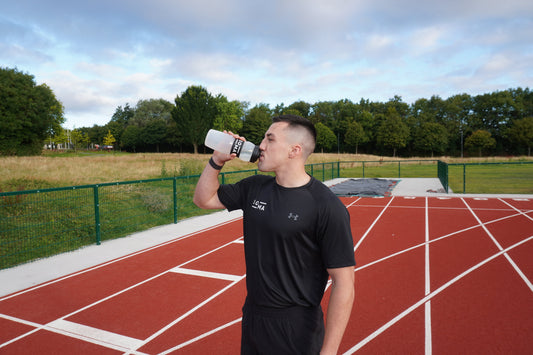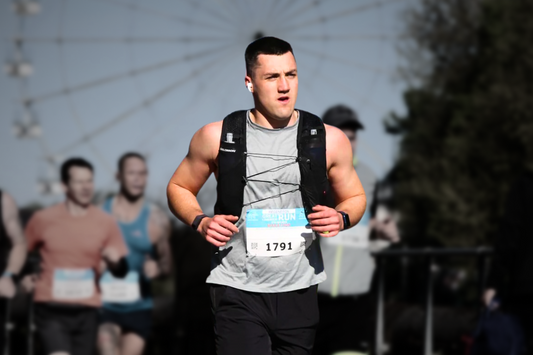Hydration is a fundamental aspect of running performance and recovery. However, understanding the optimal timing for electrolyte intake can significantly impact how you feel during and after a run. Should you take electrolytes before your run to enhance endurance and prevent dehydration, or should you focus on replenishing lost minerals after your session to accelerate recovery? The answer depends on several factors, including your hydration status, training duration, environmental conditions, and sweat rate.
Electrolytes such as sodium and potassium play an essential role in regulating fluid balance, muscle contractions, and nerve signaling. When you sweat, these minerals are lost, and if they are not replaced in adequate amounts, dehydration, muscle cramps, and decreased performance can occur. By strategically timing your electrolyte intake, you can optimise hydration, maintain endurance, and recover efficiently.
The Goal: Optimise Hydration for Performance and Recovery
The primary goal of hydration is to ensure that you are adequately prepared for your training session, sustain hydration levels during exercise where possible, and restore balance post-exercise. This can be broken down into three key objectives:
- Start your session well-hydrated – Avoid beginning a run in a dehydrated state, as this can lead to early fatigue and a decline in performance.
- Maintain hydration during your run – While it is not always practical to consume fluids and electrolytes mid-run, particularly during shorter or lower-intensity sessions, ensuring proper pre-run hydration can help delay the onset of dehydration.
- Replenish electrolyte losses post-run – Recovery is just as important as performance. Failing to replace lost electrolytes can lead to prolonged fatigue, delayed muscle recovery, and reduced readiness for future training.
When to Take Electrolytes Before Your Run
Taking electrolytes before a run can be beneficial in several scenarios:
1. You Are Not Fully Hydrated
If you have not consumed enough fluids and electrolytes throughout the day, starting your run in a dehydrated state can lead to an increased heart rate, early fatigue, and decreased endurance. Starting to sip an electrolyte-rich drink 60–90 minutes before training ensures optimal hydration.
2. Your Run Will Last Over 60 Minutes
For runs exceeding an hour, electrolyte losses become more significant. Taking electrolytes pre-run helps prevent excessive depletion, particularly if consuming fluids mid-run is not an option.
3. You Are Running in a Hot or Humid Environment
Heat and humidity accelerate sweat production, leading to greater electrolyte loss. Pre-loading with electrolytes helps maintain fluid balance, reducing the risk of dehydration and heat-related fatigue.
4. You Have a High Sweat Rate or Lose a Lot of Salt
If you tend to sweat heavily or notice white salt stains on your clothing post-run, you may be a high salt sweater. Taking electrolytes before exercise helps counteract these losses, preventing early fatigue and muscle cramping.
5. You Are Prone to Muscle Cramps
Electrolyte imbalances, particularly sodium and potassium deficiencies, can contribute to muscle cramps. If you frequently experience cramping during runs, taking electrolytes before training may help reduce the likelihood of this occurring.
Key Takeaway: Consuming electrolytes before a run enhances endurance, delays fatigue, and helps maintain proper hydration levels. This is particularly important for longer sessions, hot conditions, and runners who experience high sweat losses.
When to Take Electrolytes After Your Run
Electrolyte intake after a run is essential when:
1. You Did Not Take Enough Electrolytes Before or During Your Run
If you started your run in a suboptimal hydration state or did not consume electrolytes mid-run, post-run replenishment becomes even more critical to restore balance.
2. Your Run Lasted Over 60 Minutes
Longer runs result in greater sweat loss. Rehydrating with electrolytes post-run aids in restoring fluid balance, muscle function, and overall recovery.
3. You Are Not Eating a Salty Meal Immediately After Your Run
Whole foods provide a natural source of electrolytes, particularly potassium. However, if your post-run meal is low in sodium, supplementing with electrolytes ensures proper replenishment.
4. You Have Another Training Session Within 12 Hours
If you train multiple times per day or have another session scheduled within a short timeframe, electrolyte intake post-run becomes crucial. Rapid replenishment enhances recovery, allowing you to perform optimally in your next workout.
5. You Feel Overly Fatigued
Excessive fatigue post-run may be a sign of dehydration or electrolyte depletion. Restoring electrolyte levels helps reduce post-exercise fatigue and muscle soreness, improving overall recovery.
Key Takeaway: Post-run electrolyte intake aids in recovery by restoring fluid balance, replenishing lost minerals, and reducing the risk of prolonged fatigue or muscle cramps. It is particularly important after long or intense training sessions.
Rule of Thumb: Pre-Run for Performance, Post-Run for Recovery
- Take electrolytes before your run if you need to enhance endurance, maintain hydration, and prevent performance drops.
- Take electrolytes after your run if you need to accelerate recovery, replenish lost minerals, and prepare for upcoming training.
While electrolyte requirements vary based on individual sweat rates, environmental conditions, and training demands, the key is to take them early rather than waiting until dehydration becomes an issue. Hydration is not just about water intake - it is about maintaining the right balance of electrolytes to support optimal performance and recovery.
For athletes and high-performing individuals, a well-structured hydration strategy that includes both pre- and post-run electrolyte intake can significantly improve training quality and long-term progress. Instead of playing catch-up with hydration, set yourself up for success by proactively managing electrolyte intake.
If you are serious about your training, prioritise hydration before it becomes a limiting factor. Smart hydration leads to better performance, faster recovery, and fewer setbacks in your training routine.
Looking for an electrolyte formula designed for high-performance training? Try SOMA Electrolytes - formulated with the right balance of sodium, potassium, and other key minerals to support hydration and endurance. Stay ahead of dehydration and perform at your best.





